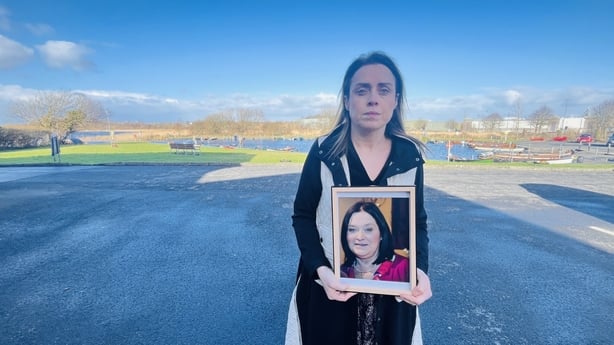The Health Service Executive has acknowledged that failings in the care provided to a woman at Mayo University Hospital led to her death three years ago.
Carmel Grant was admitted to MUH on 4 January 2022 with severe abdominal pain caused by a perforated colon.
In the days that followed, her condition worsened before surgery was carried out on 10 January.
Ms Grant was subsequently transferred to University Hospital Galway. She never recovered and died on 13 February 2022.
A letter to her family from manager of the hospital Catherine Donohue was read by legal representatives for the HSE at the start of the inquest into the death of the 57-year-old.
In it, the hospital accepted "there were failings in the care provided to Carmel that caused her untimely death".
The letter also acknowledged "poor communication" with Ms Grant's daughter Aisling Mullahy and apologised for the upset, grief and distress caused to her.
In her statement to the Coroner’s Court in Galway, Ms Mullahy detailed how her mother was "screaming in pain" on the morning of 4 January 2022, before she was taken by ambulance to the hospital.
She could not accompany Ms Grant, as restrictions were in place due to the Covid-19 pandemic.
Ms Mullahy said she made countless attempts over the following days to ensure her mother was given appropriate care, but that she was repeatedly "brushed off" and dismissed by medical staff, who told her that Ms Grant did not need surgery and was being given the correct medication.

The inquest heard that the mother of one had been found to have a perforated colon, linked to diverticular disease.
Her daughter said it was "impossible to get any information" and that she was tortured by the thought of her mother being alone with little or no care being provided to her.
Consultant General Surgeon Mr Waqar Kahn told the inquest that a decision was made to treat the patient "conservatively" after her admission, but that had he been made aware of the scale of her deterioration by the evening of 6 January, he would have carried out surgery.
Medical records showed that Ms Grant’s C Reactive Protein levels, to indicate inflammation, had surged to 371 on that date.
The inquest heard the normal readings would be between zero and four.
Colorectal Surgeon Mr Iqbal Kahn contended that the patient’s clinical markers had improved on 7 and 8 January, before she "took a turn" the following night, at which point surgery was carried out.
Following that intervention, and in light of her condition, Ms Grant was transferred to University Hospital Galway where she was treated at the intensive care unit.
Decision to treat the patient conservatively was 'ill-informed'
By this time, she was experiencing multiple complications, chief among them respiratory failure.
A post-mortem examination determined that she died from diffuse alveolar damage.
In his closing statement to the inquest, solicitor for the Grant family Damien Tansey SC said a perforation to the colon had been identified on the day Carmel Grant was admitted and had timely action been taken by staff at the hospital in Castlebar, the outcome might have been very different.
He described the decision to treat the patient conservatively as "ill-informed".
Mr Tansey said a "dramatic deterioration in her condition continued inexorably" over the course of six days, with no evidence of improvement at any stage.
He said Ms Grant was on huge doses of antibiotics and painkillers which were masking the scale of the problem throughout.
"It was abundantly evident that the conservative treatment by the medics in Castlebar" meant that potentially life-saving surgery was not carried out at an earlier stage.
Barrister Caoimhe Daly for the HSE, told Coroner Ciaran MacLoughlin that Ms Grant presented to hospital with the condition that took hold and led to her untimely demise.
"It was a naturally occurring incident within her own body," she said, adding that this should be taken into account, in determining a verdict.
After considering the evidence, Mr MacLoughlin returned a verdict of medical misadventure.
Expressing his condolences to Ms Mullahy and her family, he said he hoped she would get some comfort from the fact that she had clearly tried, in every way possible way, to ensure that the tragic death of her mother was avoided.







